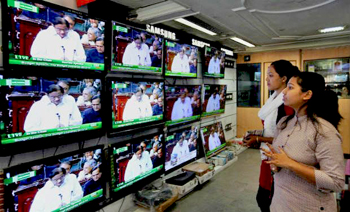New Delhi, Sep 8: Viewers of free-to-air TV channels may soon have to bear with longer commercial breaks if the Information and Broadcasting (I&B) Ministry goes ahead with its plan to scrap the existing 12-minute advertisement per hour regulation imposed by the Telecom Regulatory Authority of India (Trai).
 “We will free all free-to-air channels from the 12-minute advertisement per hour rule,” a top official in the Ministry told Deccan Herald.
“We will free all free-to-air channels from the 12-minute advertisement per hour rule,” a top official in the Ministry told Deccan Herald.
The plan is proposed only for the free-to-air channels and the ministry will have to amend the rules to bring it into effect. The move comes following a persistent demand from a section of broadcasters, who claimed that the ceiling on advertisement imposed by Trai is a “draconian step” as it ignored the fact that the free-to-air channels have no alternate source of revenue.
The Trai, on March 22, 2013, notified the regulations restricting advertising time on TV channels to a maximum 12 minutes in any given hour, amid strong protests from the broadcasters. The regulator issued the notification for its strict compliance by the broadcasters, noting that the cap was being imposed to protect the interest of consumers and quality of service being offered to them.
“The duration of advertisements on TV channels is closely related to the quality of viewing experience of the consumers,” Trai noted in its notification.
It also found that most of the TV channels were operating in “brazen breech” of the existing rules notified by the Centre in the Cable Television Networks Rules, 1994.
Out of more than 700 channels registered with the government, as many as 548 are free-to-air channels which include both non-news and news channels like India TV and News 24.
A free-to-air channel means a channel for which no fee is required to be paid to the broadcaster for its content. Since the channels are carried through the distribution chain using the infrastructure created for transmission, they have to pay the cable operator the basic service tier charges.





Comments
Add new comment